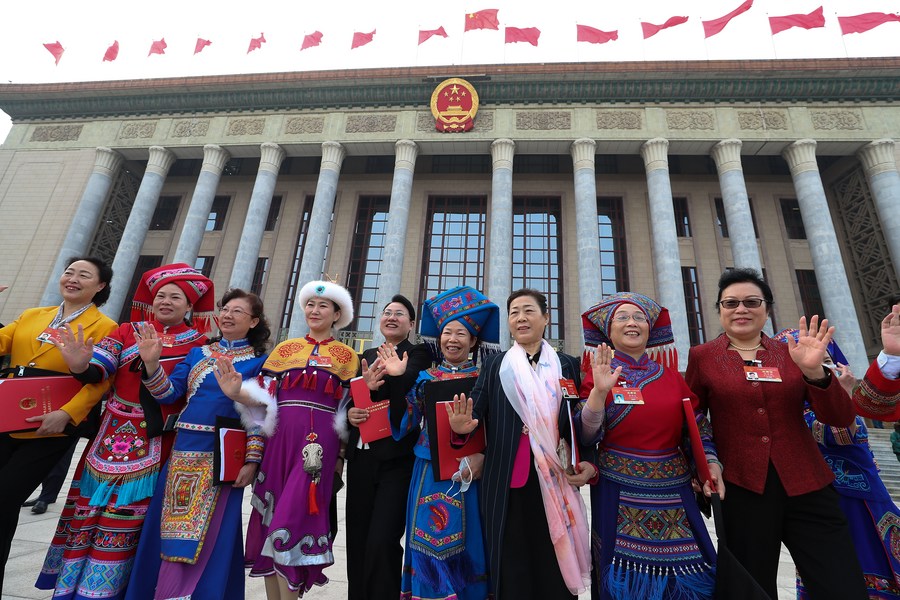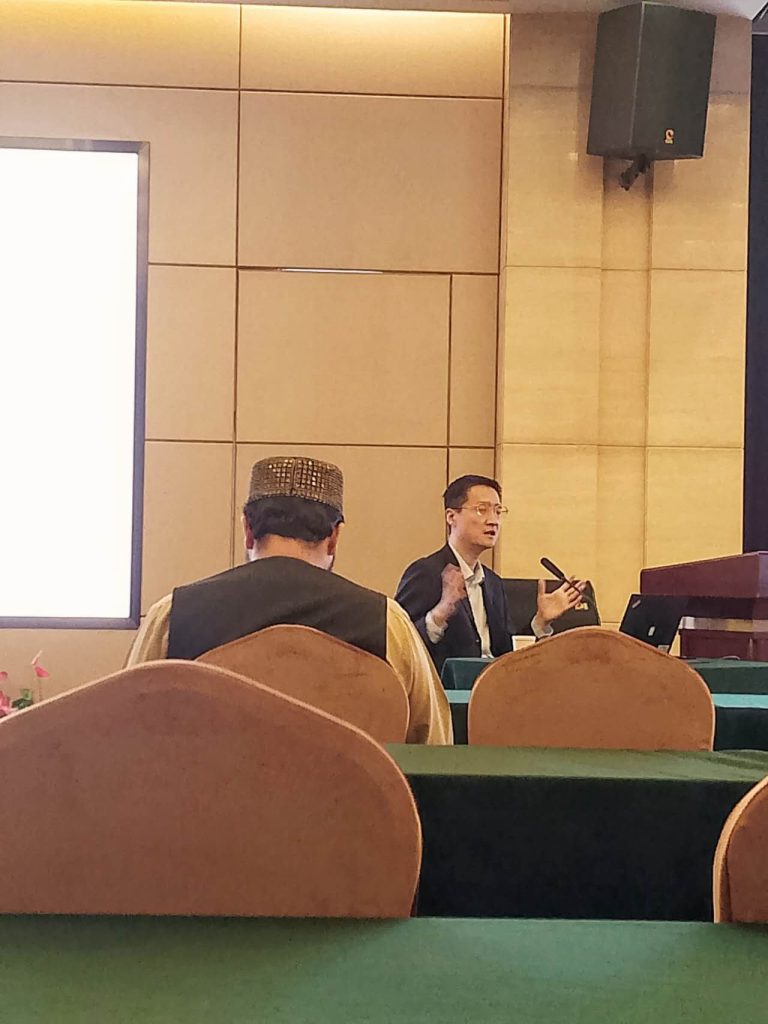WHEN people hear the term democracy, they automatically think of the western characteristics-based democracy or liberal democracy as it is the common democratic system there is in the world.
But there is also the Chinese-style democracy. This form of democracy is deeply influenced by China’s own long history, and rich people-centered culture and it has proven its effectiveness in meeting China’s development needs and fundamental interests – China’s remarkable modern advancement speaks for itself.
China’s continued pursuit of improving democratic values by ensuring the right of the people to participate extensively in state governance further saw the introduction of what is called the “Whole-Process People’s Democracy” in 2019.
International journalists on a three-month study tour in China were given valuable insight into the Chinese “Whole-Process People’s Democracy: Theory and Practice” on Wednesday 7 May in Beijing during a lecture by Professor Han Donglin from the School of International Studies of China’s Renmin University.
Prof Han said just as Liberal Democracy has strong western cultural characteristics, the Chinese Democracy is deeply influenced by China’s own history and culture.
“Thinkers and politicians in traditional Chinese society recognized the power of the people and believed that the people were the foundation of the country, playing a decisive role in its rise and fall.
“They also recognized that in order to win the support of the people, rulers must always care for ordinary people so as to maintain their rule. They recognized that the water supporting the ship can also upset it.”
He said the Communist Party of China (CPC) therefore inherited and reformed this traditional people-based thought, setting “serve the people heart and soul” as its motto.

Professor Han highlighted that due to the complexity of geographical environment and dispersiveness of their once small peasant economy, Chinese people have a high preference for centralization and national unity since ancient times.
Therefore, he said Chinese Democracy attaches great importance to centralized and unified leadership in politics, and CPC has effectively taken on this unified leadership role.
“China will never allow splitting the country in the name of democracy. So, it is under the influence of the culture of harmony that Chinese Democracy emphasizes reaching consensus through consultation to ensure political stability and concentration of power.
He highlighted that Chinese Democracy is not a confrontational system like that in the western countries, where there is “multi-party competition and bicameral parliament.”
He said a very obvious feature of the Chinese culture is pragmatism and therefore a prominent feature of Chinese Democracy.
“The Chinese people pay more attention to the actual gains that democracy brings to them, rather than just paying attention to whether China’s political system meets the standard of certain popular democratic concepts.
“China’s political elites also value the actual effect of democracy on national development and people’s lives, rather than being limited to the rules and regulations of democratic procedures.
Prof Han said President Xi Jinping has said “the forms for realizing democratic politics are rich and varied and cannot be constrained to rigid models. Practice has fully proved that Chinese-style democracy is feasible and effective in China” and this shows he is more focused on the usefulness of democracy.
He said what may be different from everyone’s impression is that Chinese democracy has actually made progress in election in the three aspects of election – Rural Election, National People’s Congress and Local Election.

Rural and Urban Democratic Practice
Prof Han said Chinese rural election has developed rapidly after China introduced the reform of opening up in 1978, and this aspect of election mainly refers to the election of village committees by villagers.
In 1979, Hezhai village, which is known as the ‘First Village of Chinese Villagers’ Autonomy’, in a meeting of village household heads, elected a new villagers’ committee director and at the same time formulated village rules and folk agreements to resolve conflicts, effectively starting governance practice of villagers’ autonomy, he highlighted.
He said the development of rural democratic practice has promoted promulgation and revision of relevant laws, and the revised Constitution of the People’s Republic of China (PRC) in 1982 confirmed the legal status of villagers’ committees as a grassroots self-governing organization.
Prof Han said in 1987, the Organic Law of Villagers Committee of the PRC (Trial) was promulgated and implemented.
“This law stipulates that the director, deputy director and members of the villagers committee shall be directed by the villagers. Villagers over the age of 18 have the right to vote and also be elected regardless of ethnicity, race, gender, occupation, family background, religious belief, education level, property status or length of residence,” he explained.
Prof Han said since the law came into effect, most rural villages in China have held more than seven general elections of villagers’ committees.
He said rural election has played a significant role in promoting the development of democracy at the grassroots level in China, adding that despite some difficulties, the overall trend of rural election is improving.
As for urban election, Prof Han said on 26 December 1989, the 11th Meeting of the Standing Committee of the 7th NPC passed the “Organic Law of the Urban Residents Committee of the People’s Republic of China.” This law stipulates that members of the Residents Committee shall be elected by local residents, household representatives or residents’ group representatives.
The earliest attempt of direct election of urban residents committee in China took place in Qingdao in 1998, and subsequently, direct election of Residents Committee was gradually implemented all over the country, Prof Han said.
Local Government Election
Prof Han said local governments in China are trying to innovate democratic elections, with the holding of local elections in a small area and there is room for adjustment and improvement on this front.
“The Federation of Trade Unions in Yuhang District began a pilot project for direct election of the chairman of the trade union of private enterprises in 1999.
“In 2001, Buyun Township in Anju District of Suining City in Sichuan Province adopted the method of direct election of the only township chief candidate by all voters, and then handed over to the township people’s congress to conduct equal election and successfully changed the head of the town,” Prof Han highlighted.
The National People’s Congress
Prof Han said People in China exercise their right to vote through the people’s congress system, the country’s fundamental political system.
The people’s congress system ensures the people are the masters of the country. People elect the delegates to the people’s congresses, directly or indirectly, from the local and provincial level to the central level-the National People’s Congress (NPC), which is the highest organ of State power.
Prof Han said the NPC is the center for popular input into laws and the economy through its committees, which work alongside professionals.
He said the NPC comprises deputies elected by provinces, autonomous regions, municipalities directly under the central government, special administrative regions and the military, and each term of office is five years.
“The election of deputies to the people’s congresses at all levels officially started in 1953.
“This is a universal suffrage on an unprecedented scale in China’s history. As a result, a total of 5,669 million grassroots people’s deputies and 1,226 deputies to the NPC were elected. In September 1954, the first NPC opened.
“Among the deputies of the 13th NPC, there are 438 representatives of ethnic minorities, accounting for 14.70 percent of the total number of deputies. All 55 ethnic minorities in the country have their own representatives. There are 742 women representatives, accounting for 24.90 percent, 468 frontline workers, and peasant representatives, accounting for 15.70 percent.”
He said the NPC, being empowered to enact laws, meets every March, but its various committees, especially Standing Committee, meet throughout the year to plan and prepare various pieces of legislations that set the political agenda of the year.
He said every five years, the NPC meets to elect government leaders – President, Premier and Vice Premiers, who are all approved before by the Political Bureau Standing Committee (PBSC).
Achievements of Chinese Democracy
Prof Han said in its decades of practice, Chinese Democracy has been constantly innovating and adjusting, and has proved to meet China’s development needs and the fundamental interests of the Chinese people.
He said the accomplishments of Chinese Democracy include:
- Rapid economic development and improvement of modernization level;
- Significant improvement of material conditions and the elimination of poverty;
- The promotion of national status and national dignity;
- High public satisfaction with the government;
- The government’s responsiveness to the people; and
- Political stability and effective political system operation.
Prospect of the “Whole-Process People’s Democracy
In a nutshell, Prof Han said Chinese Democracy cannot be measured by the standard of Liberal Democracy, and in future development of the “Whole-Process People’s Democracy” mechanism, consideration of points such as procedural standardization of democracy, competitiveness of election, making full use of modern technology will further improve its efficiency and governance quality as per the objective.
But since its introduction, the “Whole-Process People’s Democracy” has so far shown remarkable dynamism in China’s governance system as it embraces the principle of prioritizing the public as central actors in shaping decisions.
With the establishment of mechanisms to safeguard citizens’ rights to information, participation, expression and oversight, the “Whole-Process People’s Democracy” has moved beyond theoretical guarantees to fully engage citizens in the decision-making process. This includes both local and national levels, allowing for direct feedback from communities to influence policies.
By DELI-SHARON OSO
In Beijing, China

![A meeting of the NPC. [Photo:Xinhua]](https://www.solomonstarnews.com/wp-content/uploads/2025/05/A-meeting-of-the-NPC.-PhotoXinhua-1020x510.jpg)







